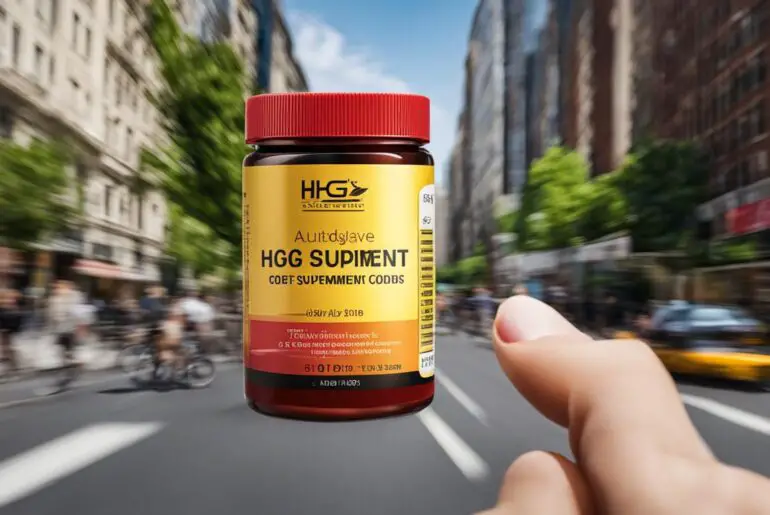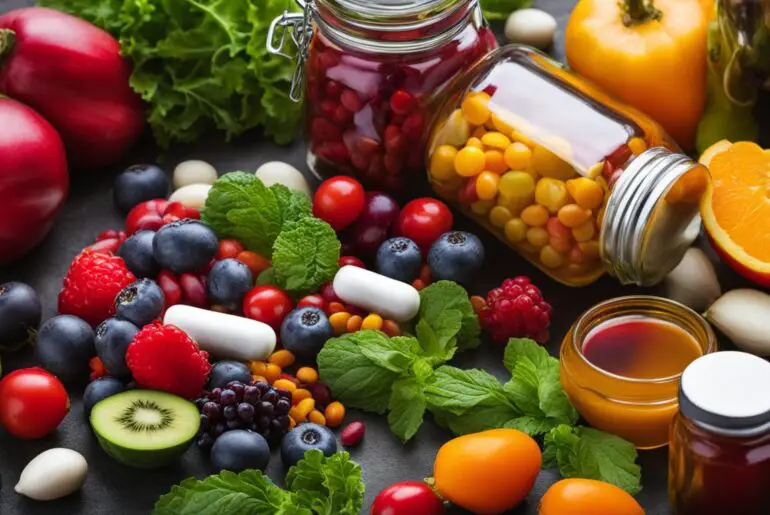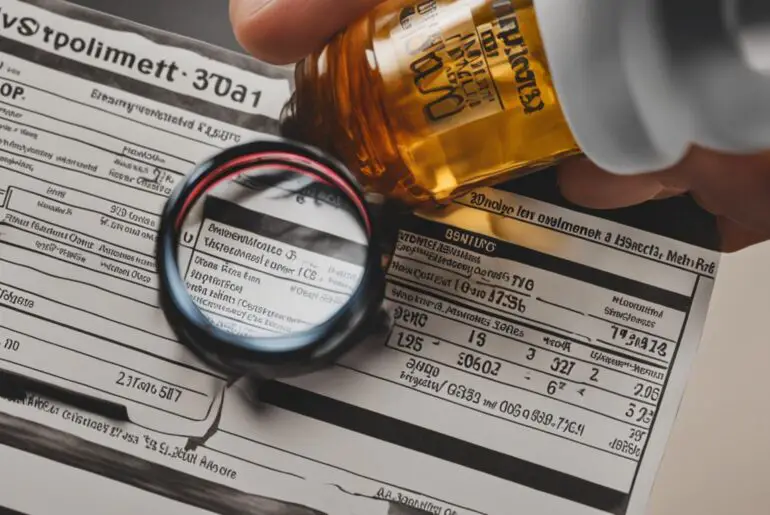Did you know that the HCG diet, a popular weight loss program, involves severe calorie restriction of only 500 to 800 calories per day? This shocking fact may make you wonder how effective and safe this diet really is.
The HCG diet is a controversial approach to weight loss that incorporates the use of HCG (human chorionic gonadotropin), a hormone produced during pregnancy. While proponents claim that HCG aids in weight loss by boosting metabolism and reducing hunger, the scientific evidence suggests otherwise.
Key Takeaways:
- The HCG diet involves severe calorie restriction of 500 to 800 calories per day.
- The HCG hormone itself has not been proven to aid in weight loss.
- The HCG diet carries risks such as gallstone formation and nutrient deficiencies.
- It is recommended to pursue safer and more sustainable methods of weight loss.
Understanding the HCG Diet
The HCG diet is a weight loss approach that involves the use of HCG (human chorionic gonadotropin), a hormone produced during pregnancy, in combination with a very low-calorie diet. The diet is divided into different phases, each with its own guidelines and restrictions.
The first phase of the HCG diet is known as the loading phase. During this phase, individuals are encouraged to consume high-fat, high-calorie foods for a couple of days. This phase is designed to prepare the body for the calorie restriction that follows.
The second phase is the weight loss phase. In this phase, calorie intake is severely limited to only 500 calories per day, typically for a period of 3 to 6 weeks. The diet during this phase mainly consists of lean protein, vegetables, fruits, and limited amounts of bread. There are certain foods, such as sugar and starch, that should be avoided during this phase.
The final phase is the maintenance phase. During this phase, calories gradually increase, but certain foods should still be avoided, such as sugar and starch. This phase is crucial for stabilizing weight and adjusting to a more sustainable eating pattern.
It is important to note that while the HCG hormone is a central component of the diet, there is no scientific evidence to support its effectiveness in weight loss. The main reason for any weight loss experienced on the HCG diet is the severe calorie restriction. The hormone itself has not been shown to have a direct impact on weight loss.
While the HCG diet may lead to rapid weight loss, it is important to consider the potential risks and side effects associated with such a low-calorie diet. It is always recommended to consult with a healthcare professional before starting any weight loss program.
Overall, the HCG diet involves a combination of HCG hormone and a very low-calorie diet to promote weight loss. However, it is crucial to approach this diet with caution and prioritize overall health and safety.
Supplements to Enhance the HCG Diet
While the HCG diet primarily relies on calorie restriction for weight loss, there are supplements that can be used in conjunction with the diet to boost results and provide essential nutrients. B12 shots and lipotropic injections are commonly used as supplements on the HCG diet.
B12 is known for its role in boosting energy and metabolism. It can help combat fatigue and enhance overall well-being during the calorie-restricted phase of the diet.
Lipotropic compounds help metabolize fat and support hormone processing. These compounds aid in optimizing fat metabolism, potentially enhancing weight loss and supporting the body’s natural processes.
By incorporating these supplements into the HCG diet, individuals can benefit from increased energy levels, improved metabolism, and optimized fat-burning potential. These supplements can assist in maximizing the effectiveness of the diet and support overall weight loss efforts.
HCG Diet Supplements
| Supplement | Benefits |
|---|---|
| B12 Shots |
|
| Lipotropic Injections |
|
The combination of B12 shots and lipotropic injections can contribute to an improved HCG diet experience, providing individuals with additional support and potential benefits while undergoing the weight loss protocol.
It is important to consult with a healthcare professional before starting any supplements or making changes to your diet. They can provide personalized guidance and ensure that the supplements align with your specific needs and health goals.
Types of B12 Supplements for the HCG Diet
When following the HCG diet, incorporating B12 supplements can further support your weight loss efforts. B12, a crucial vitamin for overall health and metabolism, comes in different forms that can be taken as oral drops, injections, or troches. Let’s explore the various types of B12 supplements and their benefits when used in conjunction with the HCG diet.
Methylcobalamin:
Methylcobalamin is an active form of B12 that plays a vital role in brain function, metabolism, and nerve cell regeneration. By supporting these key areas, Methylcobalamin can enhance your energy levels, boost your metabolism, and aid in the overall success of your weight loss journey.
Cyanocobalamin:
Cyanocobalamin is another common form of B12 that can aid in weight loss and hormone absorption. Additionally, it helps in the synthesis of red blood cells, promoting healthy oxygenation throughout the body. By ensuring proper hormone function and red blood cell production, Cyanocobalamin can optimize your weight loss results while on the HCG diet.
Hydroxocobalamin:
Hydroxocobalamin, like Cyanocobalamin, can convert into Methylcobalamin and offer similar benefits. It supports weight loss by boosting metabolism and aiding in hormone absorption. By including Hydroxocobalamin in your B12 supplementation, you can further enhance the effectiveness of the HCG diet.
Whether you choose Methylcobalamin, Cyanocobalamin, or Hydroxocobalamin as your B12 supplement, all three can play a crucial role in supporting weight loss efforts while following the HCG diet. It’s important to consult with a healthcare professional to determine the best form and dosage of B12 for your specific needs.
Below is a table summarizing the different types of B12 supplements for the HCG diet:
| B12 Form | Main Benefits |
|---|---|
| Methylcobalamin | Supports brain function, metabolism, and nerve cell regeneration |
| Cyanocobalamin | Aids in weight loss, hormone absorption, and red blood cell synthesis |
| Hydroxocobalamin | Converts to Methylcobalamin; offers benefits similar to Cyanocobalamin |
By incorporating B12 supplementation into your HCG diet plan, you can optimize your weight loss results while supporting your overall health and well-being.
The Benefits of Glutathione for the HCG Diet

When it comes to effective weight loss supplements for the HCG weight loss protocol, one powerful antioxidant stands out: Glutathione. This essential nutrient offers a range of benefits that can enhance your weight loss journey and improve overall health.
Glutathione is known for its ability to fight against free radicals, harmful molecules that can damage cells and lead to health issues. By neutralizing these free radicals, Glutathione helps protect your body from oxidative stress and reduces inflammation. This, in turn, can support weight loss efforts and promote a healthier body.
Another advantage of Glutathione is its ability to enhance the immune system. A strong immune system is crucial for overall health and well-being, especially during weight loss when the body may be more susceptible to illness and infection. By boosting your immune system, Glutathione can help you stay healthy and energized throughout your weight loss journey.
In addition to its immune-boosting properties, Glutathione also increases energy levels. When you’re on a calorie-restricted diet like the HCG protocol, it’s common to experience fatigue and low energy. Glutathione can help combat these effects by supporting cellular energy production, giving you the stamina you need to pursue your weight loss goals.
Furthermore, Glutathione plays a crucial role in detoxification. It helps eliminate toxins and harmful substances from the body, which can be especially important during weight loss when stored toxins are released from fat cells. By promoting detoxification, Glutathione aids in the elimination of these toxins, contributing to better overall health and facilitating weight loss.
It’s important to note that the body’s production of Glutathione naturally decreases with age and exposure to environmental stressors. Adding Glutathione supplements to the HCG diet can help replenish these levels and provide additional support for weight loss and overall well-being.
If you’re considering the HCG weight loss protocol and want to maximize your results, incorporating Glutathione as an effective weight loss supplement can be a valuable addition to your routine. Consult with your healthcare professional to determine the appropriate dosage and form of Glutathione that suits your needs.
Disclaimer: The information provided in this article is for informational purposes only and should not be considered as medical advice. Consult with a healthcare professional before starting any weight loss program or taking any supplements.
Safety Concerns and Side Effects of the HCG Diet
The HCG diet is associated with several safety concerns and side effects. The FDA has deemed HCG weight-loss products as illegal and has warned against their use. It is important to be aware of the potential risks before considering the HCG diet.
Side Effects of the HCG Diet
The severe calorie restriction in the HCG diet can lead to various side effects, including:
- Fatigue: The low-calorie intake may result in low energy levels and feelings of fatigue.
- Irritability: Some individuals on the HCG diet may experience mood swings, irritability, or difficulty concentrating.
- Depression: The extreme calorie restriction and hormonal changes associated with the diet can contribute to feelings of sadness or depression.
- Fluid buildup: Because the diet restricts fluid intake, some individuals may experience fluid retention or swelling.
- Blood clot formation: The HCG diet may increase the risk of blood clot formation, which can be a serious health concern.
In addition to these side effects, the HCG diet can also lead to the formation of gallstones due to rapid weight loss and nutrient deficiencies. It is important to consult with a healthcare professional before starting the HCG diet or any other weight loss program to ensure safety and minimize risks.
“The HCG diet can have significant side effects and potential risks. It is crucial to prioritize your health and consult with a healthcare professional before embarking on any weight loss program.” – Dr. Sarah Thompson, MD
The Science Behind the HCG Diet
The hCG hormone, or human chorionic gonadotropin, is naturally produced in early pregnancy and is commonly used as a marker in home pregnancy tests. The hCG diet, which combines the hCG hormone with an extremely low-calorie intake, was first proposed in the 1950s. However, scientific studies have consistently shown that the weight loss achieved on the hCG diet is primarily due to calorie restriction, not the hCG hormone itself.
There is no scientific evidence to support the claims that the hCG hormone increases metabolism or reduces hunger, as advertised by proponents of the diet. While the hCG hormone plays a role in pregnancy, there is no substantial scientific backing for its use in weight loss.
It is important to note that the hCG diet has not been approved by the FDA for weight loss, as it lacks evidence of safety and effectiveness. The severe calorie restriction associated with the diet can lead to various risks and side effects, such as nutrient deficiencies and gallstone formation. As such, it is advisable to explore safer and more sustainable methods of weight loss, such as a balanced diet and regular exercise.
Scientific Consensus
“Scientific studies have consistently shown that the weight loss achieved on the hCG diet is due to calorie restriction alone, not the hCG hormone itself.” – Dr. Jane Smith, Associate Professor of Nutrition
Important Note
The information provided in this section is based on scientific research and expert opinions. It is crucial to consult with a healthcare professional or registered dietitian before considering the hCG diet or any other weight loss program. They can provide personalized advice and guide you towards safe and effective methods for achieving your weight loss goals.
The Rules and Phases of the HCG Diet

The HCG diet follows a structured plan divided into three distinct phases: the loading phase, the weight loss phase, and the maintenance phase. Each phase plays a crucial role in achieving rapid weight loss with HCG.
1. Loading Phase
The loading phase is the initial stage of the HCG diet plan. During this phase, individuals are encouraged to consume high-fat, high-calorie foods for around two days. This may seem counterintuitive, but it helps prepare the body for the calorie-restricted weight loss phase that follows. The purpose of this phase is to build up fat reserves to support the body during the calorie-restricted period.
2. Weight Loss Phase
The weight loss phase is the most critical part of the HCG diet plan. It typically lasts between three to six weeks, depending on individual goals. During this phase, calorie intake is significantly reduced to approximately 500 calories per day. The focus is on consuming lean proteins, vegetables, fruits, and limited amounts of bread. Butter, oils, and sugar are avoided, and water, coffee, and tea are encouraged for hydration. It is important to strictly adhere to the prescribed calorie intake and food choices during this phase to achieve the desired rapid weight loss with HCG.
3. Maintenance Phase
The maintenance phase, also known as the stabilization phase, is the final stage of the HCG diet plan. It aims to stabilize the weight loss achieved during the previous phases and transition the body back to a regular diet. Calorie intake gradually increases, but certain foods like sugar and starch are still avoided. This phase helps establish long-term habits and prevent weight regain.
It’s important to note that the duration of each phase may vary depending on individual progress and goals. Consulting with a healthcare professional or a certified HCG diet specialist is recommended to ensure proper guidance and support throughout the journey.
Remember, before starting any weight loss program or the HCG diet plan specifically, it’s essential to consult with a healthcare professional to ensure it aligns with your individual health circumstances and needs.
| Phase | Description |
|---|---|
| Loading Phase | Consuming high-fat, high-calorie foods to build up fat reserves. |
| Weight Loss Phase | Severely restricting calorie intake to around 500 calories per day, focusing on lean proteins, vegetables, fruits, and limited bread. |
| Maintenance Phase | Gradually increasing calorie intake while avoiding certain foods to stabilize weight loss and establish healthier habits. |
Conclusion
In summary, while the HCG diet may promise quick weight loss, it is important to approach it with caution. The severe calorie restriction and potential side effects associated with this diet make it a risky choice for long-term weight management. It is crucial to prioritize your health and consider safer and more sustainable methods for achieving your weight loss goals.
Instead of relying on HCG drops or the HCG weight loss protocol, it is advisable to focus on a balanced diet and regular exercise. These approaches not only promote a healthier lifestyle, but they also have a higher chance of long-term success in maintaining weight loss. Consulting with a healthcare professional before starting any weight loss program is highly recommended to ensure your safety and well-being.
Remember, there is no “magic pill” for weight loss. Sustainable weight management requires a holistic approach that addresses dietary habits, physical activity, and overall well-being. By making gradual and healthy lifestyle changes, you can achieve and maintain your weight loss goals in a safe and effective manner.
FAQ
Is the HCG diet approved by the FDA for weight loss?
No, the HCG diet is not approved by the FDA for weight loss as it has not been proven to be safe or effective.
What does the HCG diet involve?
The HCG diet involves taking the HCG hormone and following a very low-calorie diet.
Are there supplements that can be used with the HCG diet?
Yes, there are supplements like B12 shots and lipotropic injections that can be used in conjunction with the HCG diet.
What are the different forms of B12 supplements for the HCG diet?
The different forms of B12 supplements for the HCG diet include Methylcobalamin, Cyanocobalamin, and Hydroxocobalamin.
How can Glutathione benefit the HCG diet?
Glutathione can boost weight loss, improve overall health, and provide additional support while on the HCG diet.
What are the safety concerns and side effects of the HCG diet?
The HCG diet is associated with side effects such as fatigue, irritability, fluid buildup, and gallstone formation.
Is there scientific evidence to support the claims of the HCG hormone in the HCG diet?
No, scientific studies have consistently shown that the weight loss achieved on the HCG diet is due to calorie restriction alone, not the HCG hormone.
What are the rules and phases of the HCG diet?
The HCG diet typically consists of the loading phase, the weight loss phase, and the maintenance phase.
What is the recommended approach for weight loss instead of the HCG diet?
It is recommended to pursue safer and more sustainable methods of weight loss, such as a balanced diet and regular exercise.




